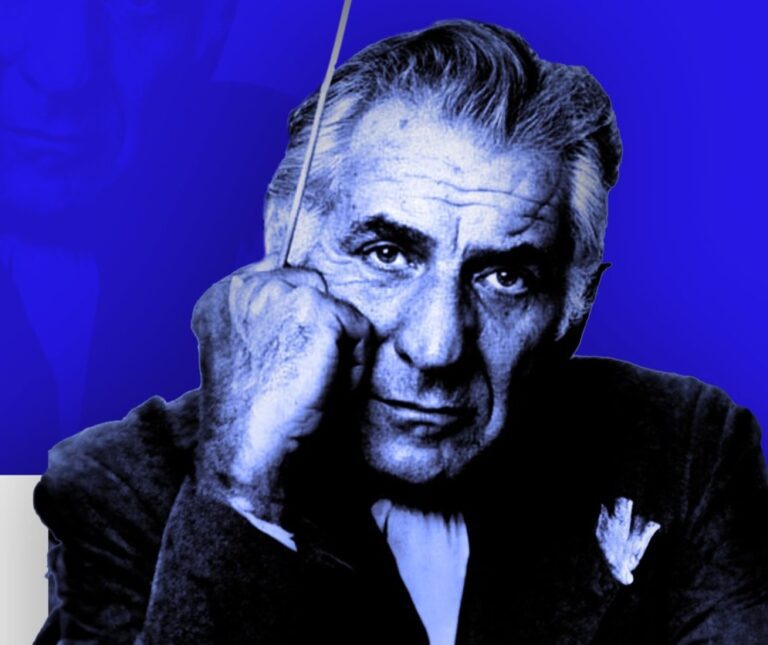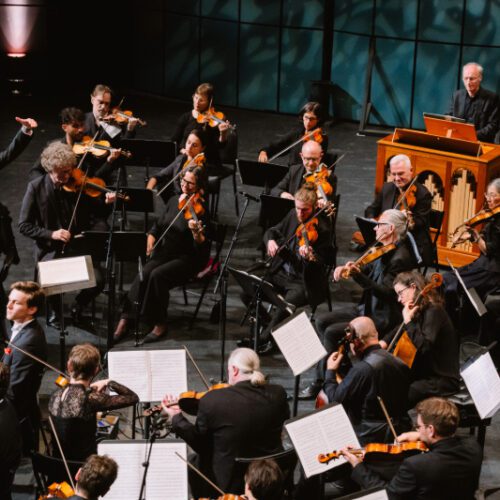The Orchestre classique de Montréal (OCM) gave a benefit concert under the auspices of the music of Leonard Bernstein, on Saturday, May 3, 2025. The concert featured soprano Sharon Azrieli, mezzo Julie Nesrallah, baritone James Westman and the orchestra’s concertmaster, Mark Djokic. The money raised will be used to provide access to classical concerts for newcomers, seniors in care and other groups who do not enjoy the same opportunities as the general population.
Audacity? Artistic integrity? Austere works, in the Bernstein pantheon, dominated the evening (Arias and Barcarolles, and the Serenade (after Plato’s Symposium)). Barely two excerpts from West Side Story (the Mambo and Somewhere, placed at either end of the concert) and an aria from Candide, not even the one we’re used to (Glitter and be gay) but rather I am so easily assimilated, which also fully deserves to be heard. There was finally A Simple Song, from Mass.
If Candide was successful, with soprano Sharon Azrieli in teasing form, the Mambo suffered from rhythmic imbalances (a mortal sin in this kind of music), and Somewhere was no more than okay, with the three vocal soloists and the orchestra. Having said that, I’m happy to say that the central corpus of the concert was extremely successful, even splendid.
Arias and Barcarolles is Bernstein’s last major work (1988, a year before his death). It is a cycle of nine songs that form a narratively coherent whole, like a mini-opera, for mezzo-soprano, baritone and orchestra. In less than thirty minutes, it evokes the ups and downs of a couple’s life, from beginnings to old age, with reflections on love, life and more. The tightly-packed songwriting still allows a wide range of musical styles to shine through, including jazz, blues and modern atonalism. Unlike Mass, however, there are no head-on collisions, or even disgracious juxtapositions, between these genres. Rather, a great maturity in the organization of oppositions and eclecticism. A work that deserves to be heard much more widely.
The soloists, Nesrallah and Westman, were in very good form, especially the mezzo, whose authenticity and accuracy on stage (and within the limits of what the situation would allow) were striking. I’d never seen this lady, also a famous CBC host, on stage before. I’d like to see her again in a truly operatic setting. The orchestral score is, it must be said, formidable. The ensemble cover is stripped bare, each and everyone must fend for him-herself and cannot ‘’hide’’, rhythms intertwine, notes spurt out with skin-tight precision, and everything must be conducted with impeccable dexterity and technical firmness. Discreet but reliable conductor Mélanie Léonard and her musicians rose to the challenge.
The other big piece was the Serenade, a violin concerto that doesn’t say its name. Although better known than its predecessor, this work remains relatively demanding for a general public who know the American maestro for his musicals and his memorable conducting of great symphonic masterpieces.
The orchestra’s concertmaster, Mark Djokic, gave a remarkable performance, with a luminous, sparkling timbre and a very convincing emotional embodiment. For a “small” orchestra like the OCM, the presence of a soloist of Djokic’s calibre is a real treat. Once again, the orchestra, which Bernstein doesn’t often let rest, rose to the occasion, under the convincing baton of Ms. Léonard.
Your humble servant didn’t have access to the cocktails and small sandwiches that probably came with the more expensive (and more mission-critical) tickets, but we can rest assured that ladies and gentlemen Nesrallah, Westman, Djokic and Léonard (and all the other musicians) must have received well-deserved accolades when they arrived among the guests after the concert (notwithstanding the few downsides mentioned at the start of this article).
























